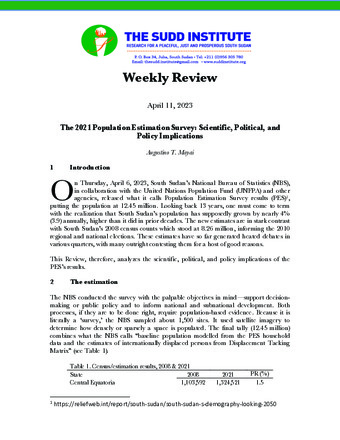The 2021 Population Estimation Survey: Scientific, Political, and Policy Implications
Publication Summary
On Thursday, April 6, 2023, South Sudan’s National Bureau of Statistics (NBS), in collaboration with the United Nations Population Fund (UNFPA) and other agencies, released what it calls Population Estimation Survey results (PES), putting the population at 12.45 million. Looking back 13 years, one must come to term with the realization that South Sudan’s population has supposedly grown by nearly 4% (3.9) annually, higher than it did in prior decades. The new estimates are in stark contrast with South Sudan’s 2008 census counts which stood at 8.26 million, informing the 2010 regional and national elections. These estimates have so far generated heated debates in various quarters, with many outright contesting them for a host of good reasons.
This Review, therefore, analyzes the scientific, political, and policy implications of the PES’s results.
Augustino Ting Mayai's Biography
Augustino Ting Mayai is the former Managing Director of the Sudd Institute. He is a founding Research Director of the same institution, serving in this capacity for a decade. He holds a Ph.D. in Sociology, with concentrations on demography and development from the University of Wisconsin-Madison. He currently studies how state effectiveness affects child health outcomes in South Sudan and Ethiopia. Dr. Mayai has written extensively on South Sudan’s current affairs. August is the current Chair (Statistician General) of the National Bureau of Statistics, Government of South Sudan.

